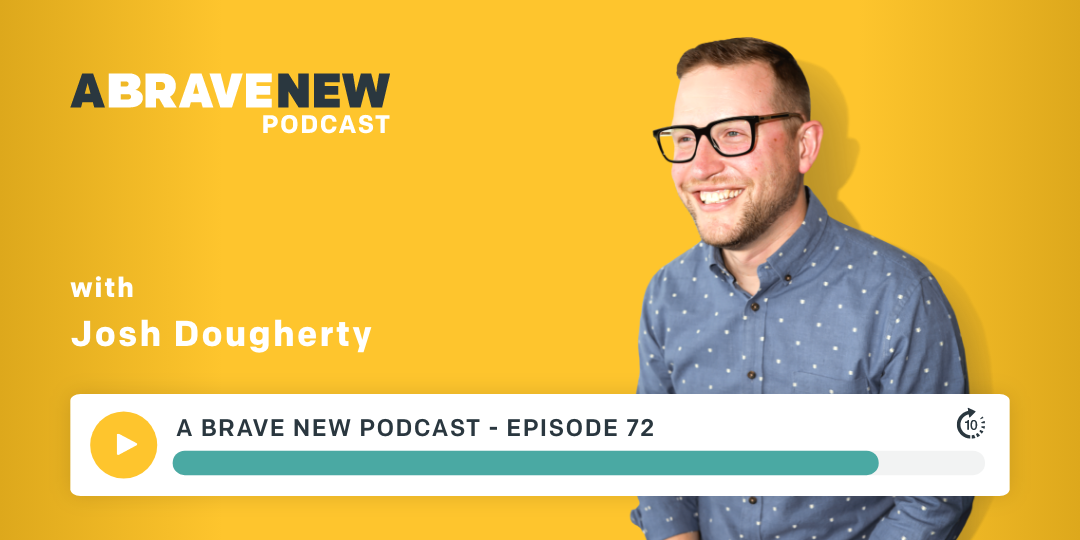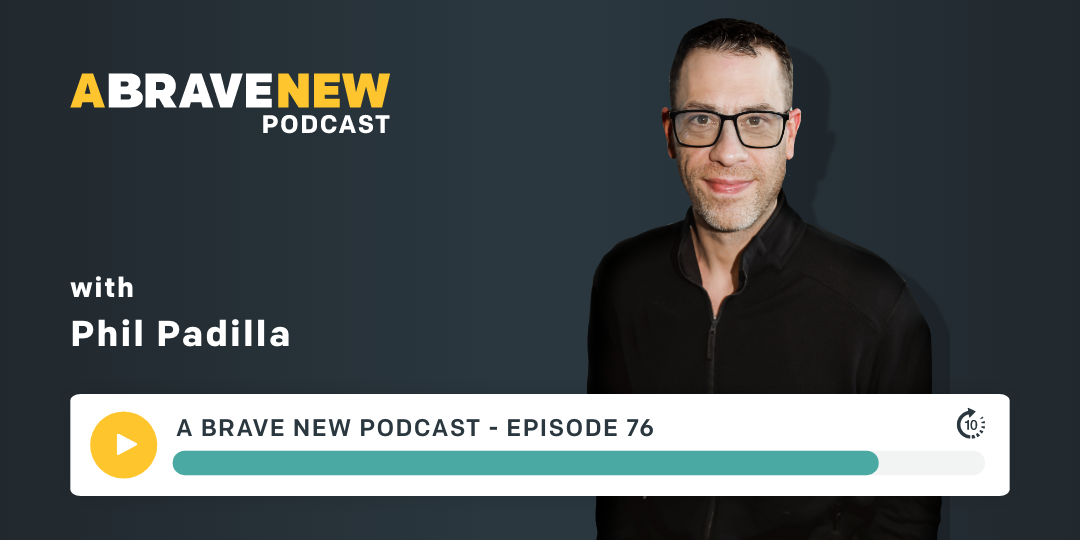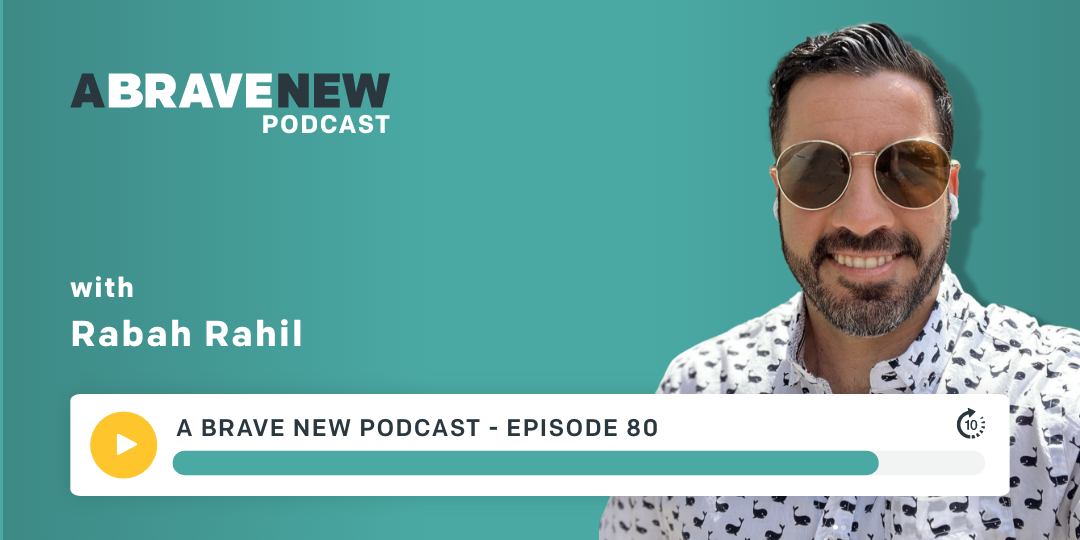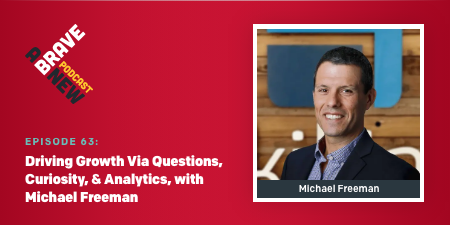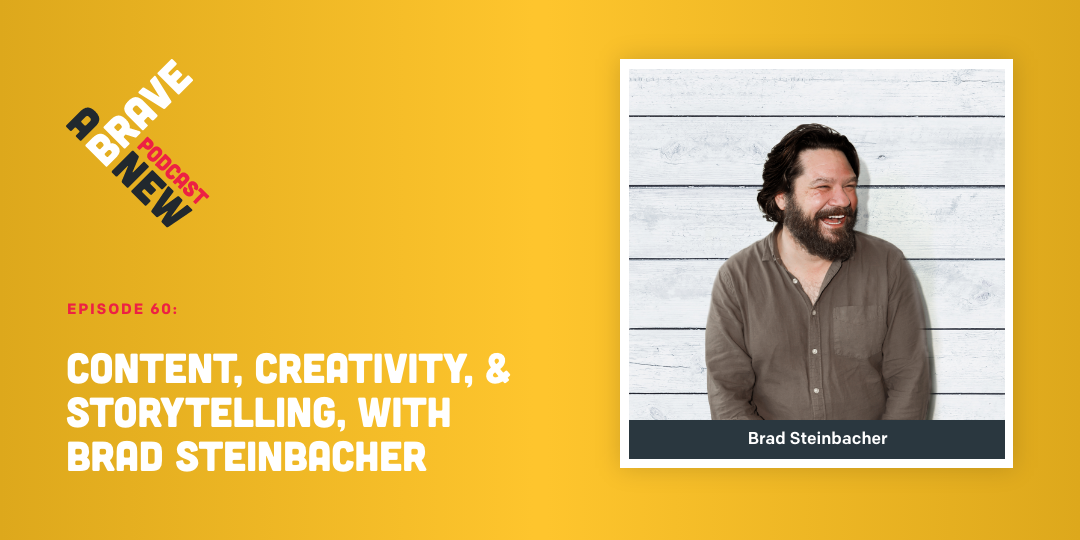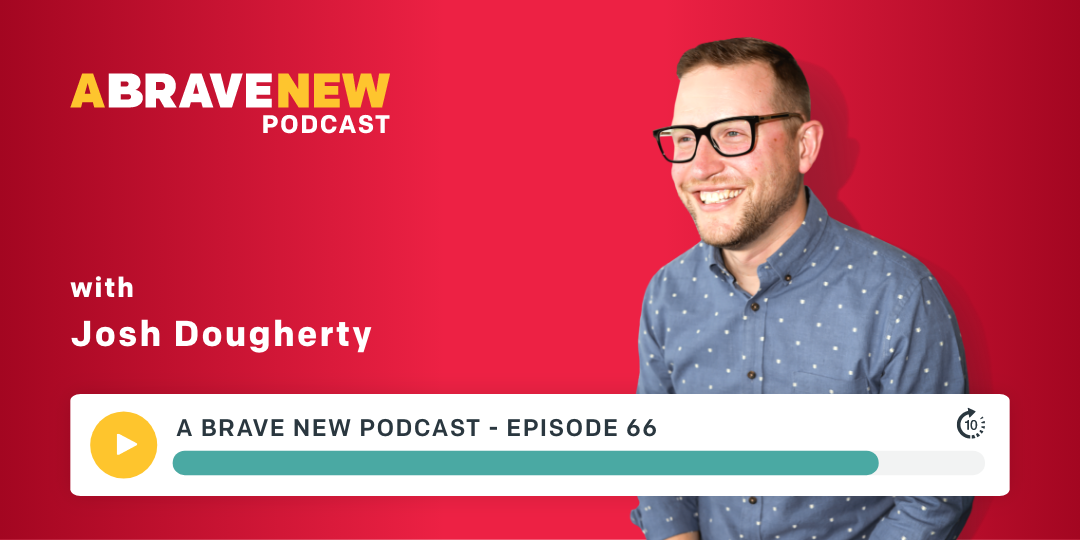Polly Yakovich is Co-founder and CMO at A Brave New, a Seattle digital marketing agency focused on helping businesses accelerate their growth through inbound marketing, branding, and web design. She specializes in working with clients to identify barriers to their growth and overcoming them with strategic content and marketing tactics. She has more than fifteen years of experience in digital marketing and branding.
What you’ll learn about in this episode:
- Why ABM is becoming synonymous with B2B Marketing - the only method that is successful
- How ABM can bring you business transformation with an account-centric approach
- Why only 1% of leads generally become clients, a 99% fail rate
- Why you need to destroy the silos between marketing and sales and become one singularly focused organization
- How an account-centric approach changes acquisition, upsells, and client retention
Additional Resources:
- ABM Is B2B.: Why B2B Marketing and Sales Is Broken and How to Fix It
- ABN Podcast: ABM: Account-Based Marketing, with Josh Dougherty
- ABN Blog Post: Account-Based Marketing Is B2B Marketing
- Terminus ABM Platform
- A Brave New’s website
Show Transcription:
Intro: Welcome to A Brave New Podcast, the podcast all about how brave entrepreneurial companies are unlocking their business potential using inbound marketing. Here is your marketing expert and host Polly Yakovich.
Hello, and welcome back to A Brave New Podcast. I'm your host Polly Yakovich. And today I want to talk broadly about marketing in 2022. I know this is a super big topic, but I want to talk today specifically about high value B2B marketing and some of the changes we've seen over the last few years specifically, how B2B marketers need to lean into account based marketing more than ever this year. And in fact, I recently read this book ABM Is B2B: Why B2B Marketing and Sales Is Broken and How to Fix it. And interestingly enough, this book is a couple years old, but I think for many, many organizations, particularly if you're not on the cutting edge, I would say in your marketing and sales organizations, this book is as relevant, more relevant than ever before. And I would say even based on the last couple years of how the environment has shifted with the pandemic, the truths in this book are more crucial now than maybe even two years ago.
So if you started pivoting really heavily into ABM over the last couple years, then you're certainly ahead. But for many, many organizations I see, these changes are still super revolutionary. Maybe we haven't pivoted all the way. Maybe our ABM tests were set up in such a way that they kind of filtered out. I still see a lot of organizations operating on a traditional model, and I really want to today talk about how you might start to convert your marketing methodology more to this ABM first modern marketing approach. And I think if you're in direct customer B2C, D2C, much less relevant, in fact, mass marketing is still really important for those kinds of products and services. But when you're talking about high value B2B, which is mostly what we focus on, these truths and tactics of ABM and how ABM is working today are more important than ever.
And I want to talk about all of this as a way to get you thinking, but this is obviously an absolutely huge and complicated topic. And it's hard to speak broadly about account based marketing when account based marketing at its origins is about specificity, personalization, one to one marketing approach based on what your product or service is, what your addressable marketplace is, and who your ideal customers would be. And so I really want to talk about this more as food for thought and really encourage you. My best hope for our chat today would be that this is a springboard to you thinking about like, oh yeah, I can see how some of that's true for our organization. How can we start setting ourselves up for a better future? I really encourage you to do your research. There's tons of research out there. I'm going to link to some of the things I'm going to talk about today.
Every organization, HubSpot, Salesforce, everyone is talking about account based marketing and providing you with the tools to do so. The writers of this book, they founded the agency Terminus. There's a lot of resources there as well. I'll link to a lot of them, but there's a lot of places you can go. And depending on who you use for your marketing technology, they probably have resources for you. Obviously we're HubSpot partners. HubSpot has some account based resources and they're getting better and better every day. So we've talked about account based marketing before on the podcast. If this is a new concept to you, encourage you to do some Googling. I'm not going to spend so much time talking about the mechanics of account based marketing, but I do think a lot of B2B orgs are still lagging behind when it comes to pivoting into an ABM approach.
And there are several reasons for this, really good reasons. I'm going to get into some of them later. As I talk, some of them will become immediately apparent to you depending on your organization and the challenges that you are facing. So this book has a lot of gems that really dovetail with our agency experience and the experience of some of our larger high value B2B clients over the past couple years. One of the things I really want to emphasize, and this isn't a new conversation, but still really relevant for a lot of us, is the problems we have with the traditional marketing funnel and why over the last few years, HubSpot and others started talking about things more like the flywheel and how to involve ABM in your approach. And the reality is that most B2B marketers know that most of what we do in a traditional marketing model just doesn't work.
In fact, this is like, I think a four or five year old data point and probably smaller than ever, but Forrester a few years back said that a fewer than 1% of all leads turn into customers. And I think of the pivot to digital over the last few years and how just absolutely crowded the marketplace has been. That's probably even less today, depending on your organization and what kind of market penetration you have. And that's actually just really depressing. That means that if you are in a traditional sort of marketing approach, ads, content, inbound marketing, content marketing, a funnel approach, that means that generally speaking, 99% of what you're doing for marketing doesn't work. And it doesn't really matter. And I think all of us as marketers would argue like, yeah, but we're building trust and they might tell a friend and this and that, and there is some truth to that.
And that is true. But if we're looking at a pure numbers game, even if you said, and this would be revolutionary, even if you said 20% of your leads turned into customers, that means that 80% of what you're doing doesn't work. And in an account based approach, really you throw those funnel metrics out, truly. If you're doing account based marketing and you're still reporting sort of in a funnel methodology, here's how many website visits we have, here's how many leads we have, et cetera, you're missing a lot. In an account based approach we're going to get laser focused on your addressable market. You're going to tightly define and redefine and always be looking at and working with sales on who your ideal customer is. And then you're going to be targeting accounts for a more one to one personalized marketing effort. It's much more efficient.
And it's been proven in your Google searching, you will find stat, after stat, after stat. It's been proven to win more business. I'm not going to provide stats, because they're so variable and they depend on the industry, but really we're kind of past the conversation about whether account based marketing works and more into a conversation about where are you on the maturity curve for how your organization is leaning into account based marketing, again, high value B2B. But one of the things that makes this really complicated is that change is super hard. And as I've been talking, there's several places where you probably have in your mind thought, Ooh, that's going to be really hard because I've talked about flipping the funnel, the old way of measuring not working, I've talked about sales and marketing working closely together.
Most likely CEOs and even some CMOs are still asking where the leads are and we have to educate them that they're asking the wrong question. That's hard. That takes time. It depends on what your role is in the organization too. And what power you have to impact those conversations. Most of the research shows that if leadership isn't on board with ABM, it's not going to work. And that's because it's going to require everyone at every level to get deeply invested in a new way of thinking. With ABM, your volume is absolutely going to shrink. In fact, you want it to. In fact, you will be forcing your volume to shrink because you'll be doing other things that take you away from those volume metrics. And I think as marketers, a lot of us have sort of continued the volume myth because it works for us. To some extent the funnel does still work.
Like the math is still valid. If you're converting someone at this percent, and this percent, and this percent, eventually you do come up with customers. Even though I feel like for a lot of us in the back of our heads, we really still feel like it's just not efficient enough. We're not spending our money and time efficiently. We should be able to target and personalize and reach people on a different level. So essentially you're going to decrease your volume substantially and you're going to go after target accounts, but it requires a tightly, tightly integrated marketing and sales effort. In fact, marketing is going to more than ever be working in service to sales. And if silos exist between your marketing and sales organization, you're really going to struggle to get your ABM efforts off the ground.
So you can see where challenges with pivoting to ABM first or modern B2B marketing approach seem challenging, but an ABM approach can be transformative for your business because what if you closed 10% of leads rather than one? What if you upgraded your existing clients into additional products or services at an exponential rate to what you're doing now? Because an account based marketing approach really is an account centric approach throughout your organization. Not just when it comes to acquisition. This methodology works for existing accounts, for retention, for upgrades, for acquisition. It really is a organization transformation. And the absolutely first thing you'll have to do and your main barrier, if this isn't true for your organization is to destroy any silos between marketing and sales. You can't pivot effectively in ABM if you have these.
And I think for most organizations you do, even if you have a good relationship between marketing and sales, they still report to different people. And the relationship is still a little bit like getting credit for this over here, getting credit for this over here. And so this is why I think if you really haven't pivoted into ABM, you're going to want to do some really solid, small invested leadership supported tests so that you can prove your results all the way up. And if it's marketing's job to acquire more up leads and sales has to close them, you're going to have to be super connected because if no leads can be closed, then they aren't worth anything. And this points to some of the tension between marketing and sales that's existed since the beginning of time.
Marketing has to think more account centric. Sales has to be much more collaborative and you're going to have to build it together. Both organizations will have to transform. And an ABM effort really means everything changes, metrics change, KPIs change, measurement of success changes. The way you look at engagement is going to change. Website traffic and leads like I talked about are going to be less important.
In fact, with one of our biggest healthcare clients, we've slowly pivoted over the last few years into an ABM first strategy and volume has gone way down. And that's okay, that's intentional, but you have to be winning on the metrics and the scorecard and be developing them together with sales so that you are in a new paradigm so that you understand what you're doing and why you're looking at different metrics to be successful. When you're winning big clients, you don't need the volume that they do on the B2C side. And you're still going to be producing content, but it's going to be sales support first, it's going to be individual and personalized first, and then the marketing team can broaden it and post it on your blog for SEO and ranking, et cetera.
It's hard because you still are going to want to do some of those more mass marketing things and cover your ranking, cover your SEO. You're going to want to do some of those, but you're going to be doing them from an ABM first perspective over time and less from a mass market perspective first. You might want to ungate everything on your site, because if your goals are not to amass a huge email file, you're trying to reach a few key folks. And you can already see what those key people are doing on your site because you're reaching out, you're watching their behavior one to one, you know who they are, you know who you're targeting.
You set up your systems to record them differently. You want to be ridiculously helpful to them and build trust by giving them great information easily and quickly. When they're convinced you're the one, they're going to have a conversation. So you're not as worried about sort of those funnel steps scoring along the way. You're going to be thinking about them differently. You're going to be scoring them differently. You're going to be looking at them individually every day. Since ABM focuses on fewer accounts and much more deeply, you can really embody the essence of what we think is still true about content and inbound marketing. You're going to be ridiculously helpful, but specifically to them, their organization, their industry, what's disrupting them, how your product or service can specifically help them. You can communicate authentically. Your conversations will be more realistic. You can truly become a trusted advisor and not because they read your white paper and think you're a trusted advisor because you are actually a trusted advisor because you're advising them specifically and helping them along the way.
And I'm not talking about cheap, pretend ABM like automated LinkedIn messages that you get a thousand of a day that's written to look personal, but you know it's cut and paste. I'm not talking about mass, outbound marketing dressed up and slightly personalized to look like ABM. I'm talking about real targeted one to one focused ABM. It's super challenging. It's complicated. It requires a massive paradigm shift for the whole organization. It requires a level of contact and communication and coordination between marketing and sales that you probably haven't done before. And if you have, I'm super excited. I'd love to hear from you about how that worked and the steps that were required to turn your organization that direction, which is typically why it needs to be piloted and proven and moved into slowly. You've probably heard the phrase of land and expand. I think that that's a really good way to think about ABM and your organization, because it's going to require a team of marketing and sales people working really closely together and building it.
But I really encourage you to check out some of these resources. I'm going to link to them in the show notes. I would read this book. If you feel like your organization is behind in ABM, this is a great book to start and even really inspire you on how to do that. And they talk about the maturity curve, how to measure where you are with your shift into B2B 2.0, they call it, this ABM first methodology. And depending on your role, think about the best way to help your organization move deeper into this ABM first kind of approach over the next year. You're not going to get there perfectly this next year, but if you haven't started yet, you need to start now. The pandemic did a lot of things, but it made digital places even more cluttered with content and voices.
So if you have a high value B2B product or service it's actually a really great opportunity to stand apart from all the clutter, because you're going to be highly targeted, human, personal, and helpful, and who doesn't want that? You just really need to make sure you're building a system around it. The authors of this book and the founders of this organization, Terminus suggest an acronym they call TEAM. And they assess where you are on the B2B maturity curve using this acronym and how you can answer each of these words. And then also this becomes your growth map, your blueprint for how to get there further.
They talk about targeting, what is your targeting like? Is it disconnected? Is it static? What about engagement? Is it quantity? Is it quality? Where are you at in your engagement measurement? Activation, are you reactive? Are you proactive? How are people getting in and out? And then how are you measuring it? Are you still measuring it with a funnel? Are you measuring it with a double funnel or have you gotten to a place where you and sales are using one score card that effectively ranks and manages people?
There are lots of tools for this. I'm not going to get into them, but I really encourage you if, as I've talked, any of this has been food for thought or, oh yeah, I feel like our organization is sort of stuck measuring the wrong things. Or yeah, we're spending a lot of money and we don't know where it's going. We don't know if we're getting enough out of it. I really encourage you to help your organization lean into more of an ABM first approach. Again, starting small, piloting something out and really helping transform your organization. Thank you for listening. I'll link to everything in the show notes. And as always, you can visit abravenew.com to hear some of our thinking about all of these tools and how we're moving and pivoting and preparing ourselves for business transformation in 2022. Have a great day.
Outro: Thanks for listening to this episode of A Brave New Podcast. Go to abravenew.com for more resources and advice. If you enjoyed this episode, show us some love by subscribing, rating, and reviewing A Brave New Podcast, wherever you listen to your podcasts.
Similar Articles
OCT 11, 2021

The Beginner’s Guide to Generating Inbound Leads
Marketing doesn’t have to be painfully intrusive, like getting yet another telemarketing call right when you sit down to dinner with your family.
OCT 11, 2021

The Beginner’s Guide to Generating Inbound Leads
Marketing doesn’t have to be painfully intrusive, like getting yet another telemarketing call right when you sit down to dinner with your family.

